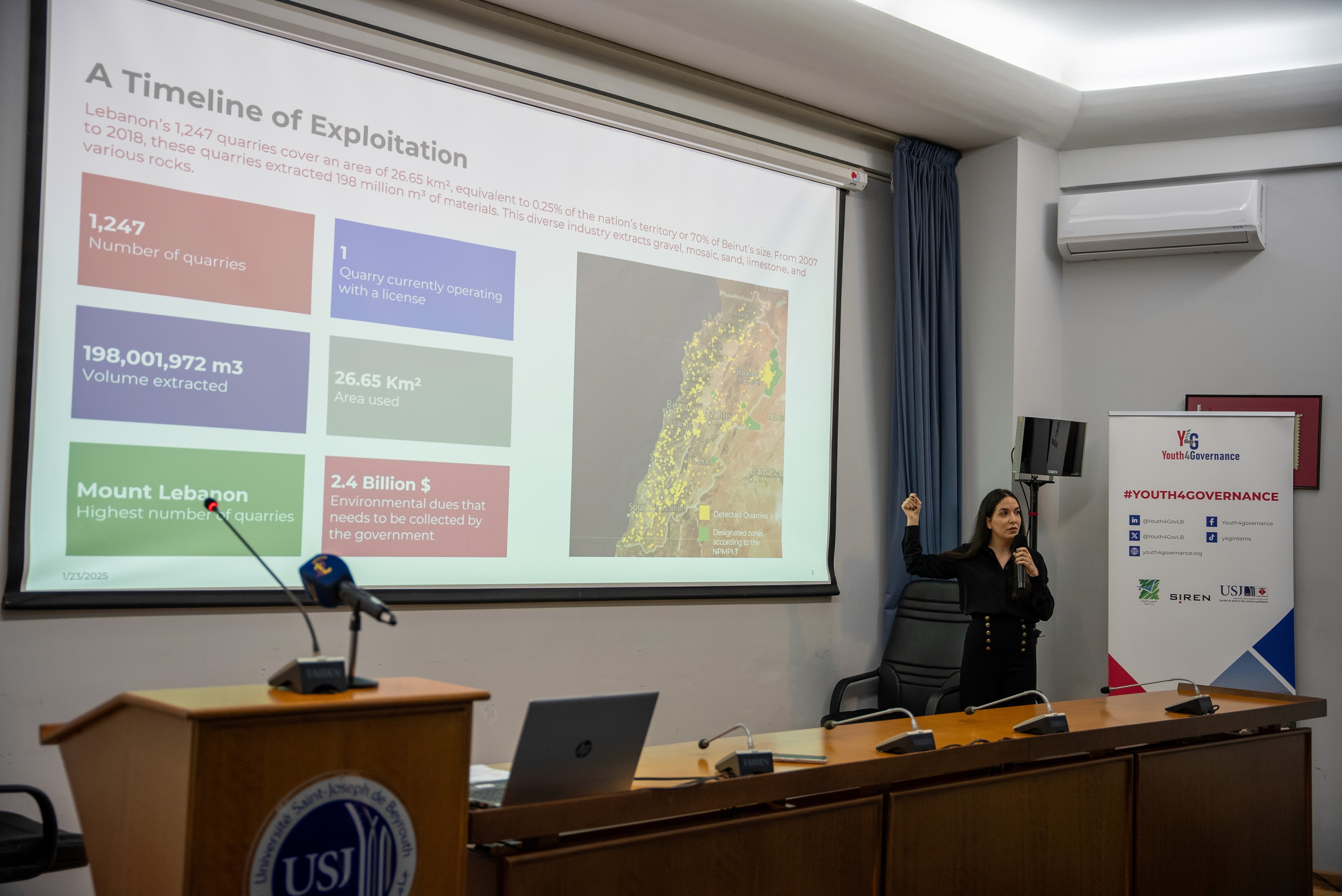Blog
Enforcing the ‘polluter pays’ principle to recoup $588M in quarry fines
Siren has introduced digital tools to help Lebanon collect millions in quarry fines, boosting transparency, accountability and environmental governance.
23 Jan 2025

Siren has partnered with Lebanon’s Environment Ministry to launch a groundbreaking initiative aimed at holding quarry operators accountable for environmental damage. As part of this effort, the ministry has begun issuing collection orders to quarry owners nationwide, seeking an initial $588 million in compensation, caretaker Environment Minister Nasser Yassin announced Thursday.
"Today is the first time we’ve put in place an organised and legally grounded system to implement the polluter pays principle," Yassin said. "Those who pollute will face up to their responsibility and pay."
The announcement came during a conference organised by Siren’s Youth4Governance internship program and Saint Joseph University, where a suite of digital tools was unveiled to enhance environmental monitoring and enforcement. Among them is an open data portal that allows the public to track the collection of dues through interactive dashboards. Yassin described the initiative as the beginning of a "serious, transparent, and tangible" push for accountability in the sector.
Professors from Saint Joseph University have been providing legal expertise and technical advice to ensure the relevance, precision and feasibility of the interventions.
“Through a scientific approach, our project seeks not to dismantle or eliminate the sector but to legalise it by issuing permits based on the conditions outlined in the law,” Marie Claude Najm, Dean of the Faculty of Law and Political Science at Saint Joseph University said.
She pointed to the Cabinet’s 4 December 2024 decision allowing certain cement factories to use illegally quarried materials for two years as an example of the “flagrant” disregard of the law that has plagued the sector. Citing its unconstitutionality, she called for its suspension.
Suggesting that the practice of sectarian spoil-sharing was partly to blame for the sector’s poor governance, Najm said: “Our wish is the restitution of the rule of law as a foundation for the actions of the government currently being formed; that it [the government] fights for justice and institutions, and dares at last to break free from the constraints imposed for decades, starting with rejecting the absurd and unconstitutional practice of allocating ministerial, administrative, or, worse, judicial positions to specific sects or political parties.”
The student-Environment Ministry initiative follows years of ineffective oversight. Over the past two decades, illegal quarries are estimated to have extracted 200 million cubic meters of material - equivalent to around 44,000 standard shipping containers each year. The cost of rehabilitating the environment is estimated to reach $1.9 billion.
To aid the collection of dues, the Youth4Governance interns developed a centralised digital platform with the ministry that automates collection order processing. They also created a computer vision tool that uses satellite imagery to monitor for illegal quarry expansion.
“The public institutions responsible for environmental monitoring and enforcement face chronic resource shortages. We created these digital tools to ease that pressure,” Marc Hajjar, an AI intern, said. “More importantly, people need to see that the process is fair and transparent; that those responsible are held accountable. These tools help with that, through open data and by bringing stakeholders together to share data and streamline oversight.”
Anticipating appeals from quarry operators, the interns developed an AI-powered legal chatbot to assist the Justice Ministry's small team of public defenders.
“Large language models can massively speed up tasks like summarisation, search and drafting,” Sara Ibrahim, an AI intern said. “We’ve connected this legal chatbot to a knowledge base of relevant environmental regulations and legislation that it can reference directly in its outputs, which makes them more accurate and context relevant. We’ve also trained it to provide a step-by-step explanation of its reasoning process for additional transparency and interpretability.”
Professors worked with interns and the Environment Ministry on a set of long-term sustainability recommendations, including partnerships with cement companies to reduce carbon emissions.
"We need a systemised approach to rehabilitation, focusing on reforestation, land restoration, and monitoring progress through digital tools," George Youness, a research intern said. "The current rate of extraction far exceeds local demand, and we're exporting resources at prices that don't account for environmental damage. Licenses should be granted based on market demand and properly price-in externalities.”
Prof. Salim Daccache, Rector of Saint Joseph University, emphasised the importance of balancing “the needs of reconstruction and environmental conservation.” Capturing the spirit of the event, he implored students, professors and universities to work together to build a state with “competencies that elevate its status and ensure its continuity.”